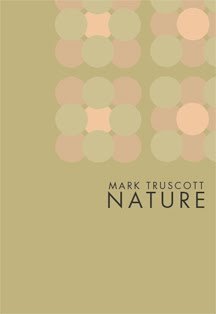in the littlest bit of a thing called a word
 A bird sings a
A bird sings aletter hangs in the balance
It might seem to some that minimalist poetry is always the same, that one minimalist poet's work always resembles another's because the possibilities of minimalism are limited, that there is no significant difference between the work of Robert Lax, Simon Cutts, Robert Grenier, Aram Saroyan, and Mark Truscott.
And Mark Truscott, alone, with nothing more than the example of his own works, prove this wrong.
As if there were such a need. Those who decry the hollowness of minimalist poetry are those who haven't slowed down enough to see it. Even in the realm of the pwoermd, where the poet has nothing but a single word to work with, the different styles of poets is apparent.
And so it is that I turn to Mark Truscott's second book of poetry, Nature, a followup of sorts to, though a completely separate work from, his first book, Said Like Reeds or Things, which introduced us to his minimalist poetry. If anything, Nature is a more decidedly minimalist book, in that it includes no examples of the longer poems that also inhabit his first book. Only a handful of the poems in this book have more than ten words, and never do they have many more words than that.
In a minimalist poem, the smallest things matter.
In the poem that opens this essayette, the opening letter is capitalized. That doesn't happen always with a Truscott poem, not even when the poem forms a sentence, so the capitalization means. Note that two indefinite articles, one majuscule, one minuscule, bookend that line, one outweighing the other, though the second carries the weight of the poem. We can read the first line as a line complete—assuming that the bird sings an a, a certain vowel, a certain note that reminds the poet of that vowel. But the a also begins the sentence of the second line: "a / letter hangs in the balance," as this one does. This letter, this a, this word, hangs between two sentences presented as one, takes on the role of one side of a traditional scale, makes us see the potential, the potential for meaning, in even the smallest words.
So this is what the book does: makes us see language and its nature. (Old mother capitalized Nature making her appearances but not taking over the focus of the book.) And the poems are tight enough, crammed with meaning, cramped into place so deftly in states of precarious balance, that we are forced to think them through just to see what they are. They are of so little visible surface that we must scratch away what little of it there is just to see the workings beneath each of them.
Nature is filled with minimalist traits, sometimes resembling Lax, sometimes Grenier, always Truscott. It plays with the sound and the visible shape of language and it plays with the always unsteady sense of language. These are poems out of kilter, poems that mean by a process of leaning hard over to one side until we see what they must be, and Truscott makes the most of the least, having purified himself, restricted his palette, maybe even his palate. He's eschewed the vagaries and temptations of great (or even moderate) length to focus on his strength.
Which means that he can write a poem that forces us to read right through it twice and then over again, that forces us to see the text as a recirculating text always disagreeing with itself, so one that is always being of the purest amber from which the finest amulet (a charm that glints in the sun and almost gives off a scent) can be made:
do you
still have
it no
I don't
anymore you
_____
Truscott, Mark. Nature . BookThug: Toronto, 2010.
ecr. l'inf.
Published on January 03, 2011 17:12
No comments have been added yet.



